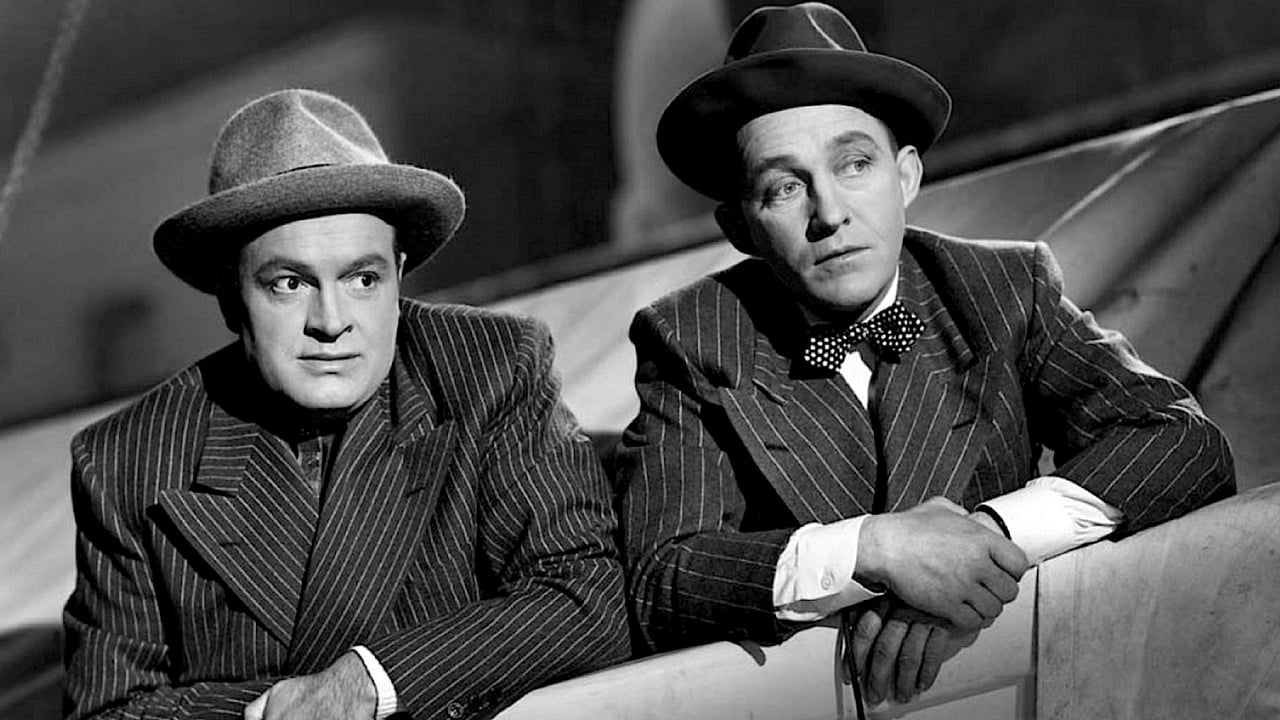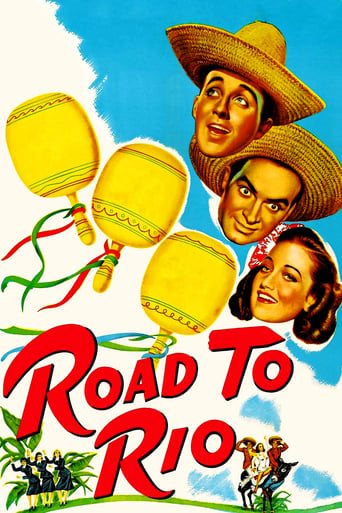

ridiculous rating
... View MoreIt's funny, it's tense, it features two great performances from two actors and the director expertly creates a web of odd tension where you actually don't know what is happening for the majority of the run time.
... View MoreMostly, the movie is committed to the value of a good time.
... View MoreGreat movie. Not sure what people expected but I found it highly entertaining.
... View MoreRoad to Rio is directed by Norman McLeod and written by Edmund Beloin and Jack Rose. It stars Bob Hope, Bing Crosby, Dorothy Lamour, Gale Sondergaard and Frank Faylen. Music is by Robert Emmett and cinematography by Ernest Laszlo.Hope and Crosby star as two vaudevillians, who after setting a circus on fire, stow away on a liner bound for Brazil. Once there they encounter a distressed woman (Lamour) who is being coerced into an unwanted marriage by her scheming guardian.The fifth in the hugely popular "Road To" series of films, Rio follows the same trajectory as before. For fans such as myself this is OK, other film fans venturing in for a first time look may be a bit bemused by it all. In fairness this one does have a solid story at its core, with hypnotism the dastardly weapon of choice, while McLeod neatly blends the comedy and musical numbers and keeps the pace brisk. Hope gets some well written topical gags to deliver and Crosby croons whilst also getting to do a number with The Andrews Sisters. In support the wonderful Sondergaard turns in another one of her memorable villainess performances, and The Wiere Brothers form part of the narrative to produce great comedic results.With a blazing first quarter, a jovial middle section and a genuinely hilarious finale, Road to Rio achieves everything a "Road To" fan could wish for. 7.5/10
... View MoreSince the very first Road To.. Picture back in 1940, each subsequent entry in the series seemed to build on its wacky and manic content, with each becoming slightly more off the wall and crazy as the last.However when the fifth entry was released in 1947, for some reason things were toned down a tad, making the Road to Rio, although still funny and enjoyable appear to lack the quirkiness and zany antics of what had gone before.The banter and wise cracks between our two heroes is as good as ever, and the musical numbers up to par as well, but in spite of this, I always have a problem associating this film with any other in the series. It seems out on it's own; out on a limb.Maybe it's because unlike its predecessors, the gang are not lost in the untamed wild of somewhere or other, perhaps its the lack of talking animals, or perhaps it has more to do with the fact that this story actually has a plot; a real story you can follow instead of the more customary and formulaic half-hearted story onto which a few gags and songs had been pinned.Still the film is enjoyable and very funny, with The Andrew Sisters, Bing's other frequent stalwarts from radio and record, joining in on the fun for 'You Don't Have to Know the Language' and a delightful comic turn from The Weire Brothers as three local boys trying to pass themselves off as red blooded Americans, despite only knowing three slang terms in English which had been taught to them by Hope and Crosby just minutes before.As I said you will enjoy this entry very much but you will probably find this movie more akin to a Bob Hope 'My Favorite Blonde/Brunette' kind of comedy than anything so far seen in the 'Road To...' franchise
... View MoreFifth of the Hope and Crosby 'road shows'. Not wacky, just straight comedy as Hot Lips Barton(Hope)and Scat Sweeney(Crosby)flee from Oklahoma and Texas avoiding matrimony. After burning down a tent show, the boys stow away on a ocean liner headed to Rio. Aboard ship, the song and dance duo fall for the luscious Lucia(Dorothy Lamour), who runs hot and cold, because she is being hypnotized by her evil aunt(Gale Sondergard)trying to force her into an arranged marriage. Songs written by the team of Johnny Burke-Jimmy Van Heusen are entertaining; the best being "But Beautiful" by Crosby and "Experience" by Miss Lamour along with Hope's bubble blowing trumpet. The cast also features: Frank Faylen, George Meeker and the Andrews Sisters.
... View MoreAlthough Hope, Crosby and Lamour were teaming together for the fifth time in a Road movie, the format and style remain fresh, with a greater emphasis on song and a more rigid plot-line than in its four predecessors. The interplay between the three stars continues to be a delight, and Gale Sondergaard makes for a wonderful villain, whilst the Wiere Brothers almost steal the show as a trio of Rio street entertainers whom Bing and Bob persuade to impersonate the last three members of the five-piece all-American band that they have promised to deliver into Nestor Paiva's nightclub. There are a number of hilarious set-pieces, particularly with Hope cycling on a tightrope, and a rousing and manic climax. As a result of all these fine features, "Road to Rio" is only a notch down from my favourite Road picture, "Road to Utopia".
... View More